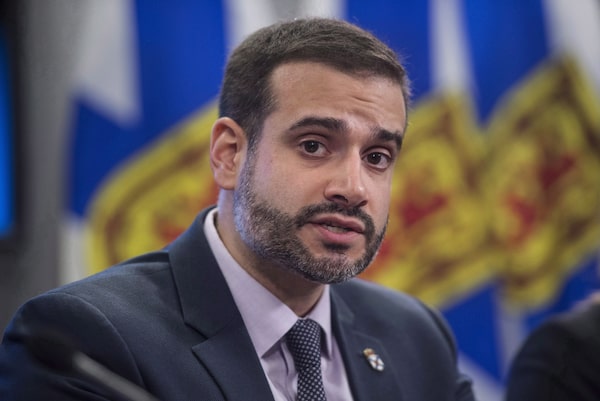
Nova Scotia Education Minister Zach Churchill speaks during a news conference in Halifax, on Jan. 24, 2018.Darren Calabrese/The Canadian Press
Nova Scotia reported 17 new cases of COVID-19 on Wednesday and New Brunswick reported six as the stream of cases from ongoing outbreaks continued in both provinces.
Health officials in Nova Scotia said 16 of the cases identified were in Halifax, including one at St. Margaret’s Bay Elementary school that was reported late Tuesday. The other case was in the province’s northern health zone and was related to travel outside of Atlantic Canada.
The province’s total number of active cases is 127.
In New Brunswick, health officials reported six new cases of COVID-19. The Moncton, Saint John, Fredericton and Edmundston regions each had one case, while there were two in the Bathurst region.
There are now 119 active cases in the province.
During an online news conference Wednesday, Nova Scotia Education Minister Zach Churchill said St. Margaret’s Bay Elementary was closed for cleaning and would remain closed on Thursday because of a scheduled professional development day.
He said a decision on reopening would be made later this week.
“That is yet to be determined because the investigation hasn’t been completed,” he said.
Churchill also said it was likely that students at two schools in Cole Harbour that were closed after cases were identified last week would return to classes on Monday.
The minister, who announced a further $14.3 million in funding to help support schools during the pandemic, was asked his thoughts on the fact there have only been five cases identified to date in the school system.
He credited good guidance from the provincial public health department and said Nova Scotians have followed that advice.
“I think our teachers, principals, support staff, our cleaners, our students should be proud,” Churchill told reporters. “It seems at this point that the majority of people are doing their part to make a difference and protect people from the virus.”
Still, he said talks were ongoing about the possibility of extending the upcoming Christmas break if needed.
The money announced for schools on Wednesday is from a federal fund announced in August, and Churchill said it would go toward a range of programs and initiatives to help keep schools safe.
He said $3.8 million would be used to boost school water supplies through the purchase of 950 touch-free water-filling stations, while $2.7 million would be used to ensure maintenance and inspections of school ventilation systems.
“This is above and beyond the (ventilation) assessments that have been done and the regular assessments,” he said. “If any issues crop up, this funding will allow us to deploy resources very quickly to deal with any maintenance issues.”
Another $1.5 million would be used to purchase additional personal protective equipment such as masks and hand sanitizer for students and staff, while $4.1 million would go toward new online math and literacy programs.
Money would also go toward school food programs, including $500,000 to meet increased demand for the existing school healthy eating program, and $1 million to support an emergency food fund that can be accessed if at-home learning is needed.
The announcement followed one last month that will see $21.5 million in federal relief money used to purchase 32,000 new computers for students and to upgrade servers and Wi-Fi systems in schools.
Meanwhile, one new case of COVID-19 was reported by Newfoundland and Labrador on Wednesday, bringing its number of active cases to 30. Health officials said the case was related to travel and involved a man between 20 and 39 years old in the eastern part of the province.
In Prince Edward Island, the government announced that those with lower incomes can now get free face masks at all food bank locations across the province.
The province said it had collaborated with the P.E.I. Association of Food Banks to distribute three-ply, non-medical reusable masks
Since Nov. 20, non-medical masks or face coverings have been mandatory in all public spaces on the Island.
Canadian authorities are assessing COVID-19 vaccine candidates while trials are underway, speeding up any eventual approval for wide use. But science reporter Ivan Semeniuk says it’s likely high-risk people will be prioritized for receiving any vaccine first, with some possibly getting it as early as the first part of 2021.
The Globe and Mail
Sign up for the Coronavirus Update newsletter to read the day’s essential coronavirus news, features and explainers written by Globe reporters and editors.